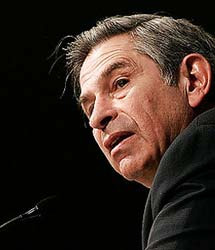 |
 |
 |
 News from Around the Americas | April 2007 News from Around the Americas | April 2007  
European Nations Pile Pressure on Wolfowitz
 Lesley Wroughton - Reuters Lesley Wroughton - Reuters


| | World Bank President Paul Wolfowitz, here attempting to address staffers as they chant for him to resign. (Alex Wong/Getty Images) |
European countries on Saturday piled pressure on World Bank President Paul Wolfowitz over a scandal involving a promotion for his girlfriend, with Britain saying it had damaged the bank and Germany questioning whether he still had the credibility to lead the institution.

But African ministers came out in support of him, with Liberia calling him a "visionary" and Mauritius saying he had done a good job.

The scandal has overshadowed the meetings of the World Bank and International Monetary Fund, one of the few occasions where rich and developing nations can discuss common issues.

Wolfowitz has apologized for his handling of the high-paying promotion of his girlfriend, Shaha Riza, who was assigned for the bank to the State Department to avoid any possible conflict of interest.

"While this whole business has damaged the bank and should not have happened, we should respect the board's process," British development minister Hilary Benn said in a statement.

"I am sure these views will be shared by other governors who will also be considering their responses."

German development minister Heidemarie Wieczorek-Zeul said it was important Wolfowitz's actions did not compromise the moral authority of the institution, which spends around $25 billion annually to fight poverty in poor countries.

"He himself has to decide whether he still has the credibility to represent the position of the World Bank," she told Reuters.

Double Standards

While bank member countries cautioned not to judge Wolfowitz until a closer examination by the bank's board of the issue is completed, bank staff and development groups stepped up questions over what they called his "double standards" on governance and fighting corruption.

Alison Cave, who heads the bank's staff association, which last week demanded Wolfowitz explain himself, said the reputation of the bank had been damaged and it was up to the bank's shareholders to act to safeguard the credibility and effectiveness of the bank in the developing world.

"How can we go out and tell governments what to do ... saying one thing and doing another?" she told Reuters.

The scandal has revived antagonism over Wolfowitz's appointment to the World Bank in mid-2005 by the U.S. administration and lingering resentment over his role in the U.S. invasion of Iraq while he was deputy defense secretary.

The White House on Friday came to Wolfowitz's defense, saying President George W. Bush had full confidence in him.

Speaking in Washington, African ministers said Wolfowitz had played a key role in promoting development in Africa.

"We have seen visionary leadership and steadfast progress under Mr. Wolfowitz," said Antoinette Sayeh, finance minister of Liberia and a former World Bank official. "He has certainly championed Africa's cause in the two years of his leadership."

Others like Zambia's Finance Minister N'Gandu Magande said they would stand by any decision made on Wolfowitz's future.

"We think he has done a good job," said Rama Sithanen, the deputy prime minister and finance minister of Mauritius.

And, on the Economy ...

As the scandal threatened to dominate the meeting, finance ministers welcomed the broad-based expansion of the world economy but cautioned that risks, including a sharper than expected slowdown in the U.S. economy, had to be monitored.

The United States, China, Japan, Saudi Arabia and European nations pledged to address distortions in the global economy that have led to large U.S. deficits, as opposed to massive surpluses in Asia and in oil producing countries.

The IMF has warned if the imbalances unwind in a disorderly way, it could trigger a recession.

The five countries promised to implement an inventory of existing plans to reduce the gaping shortfall in the United States, introduce growth-enhancing reforms in the euro area and Japan, improve investment in oil producing countries like Saudi Arabia and cut China's heavy reliance on exports.

Among the commitments, Beijing promised to gradually increase the flexibility of its currency, which should ease tensions in Washington where many lawmakers say China is deliberately suppressing the value of its currency, the renminbi, to keep its exports cheap.

(Additional reporting by Gernot Heller, Emily Kaiser, David Mcmahon) | 
 | |
 |



